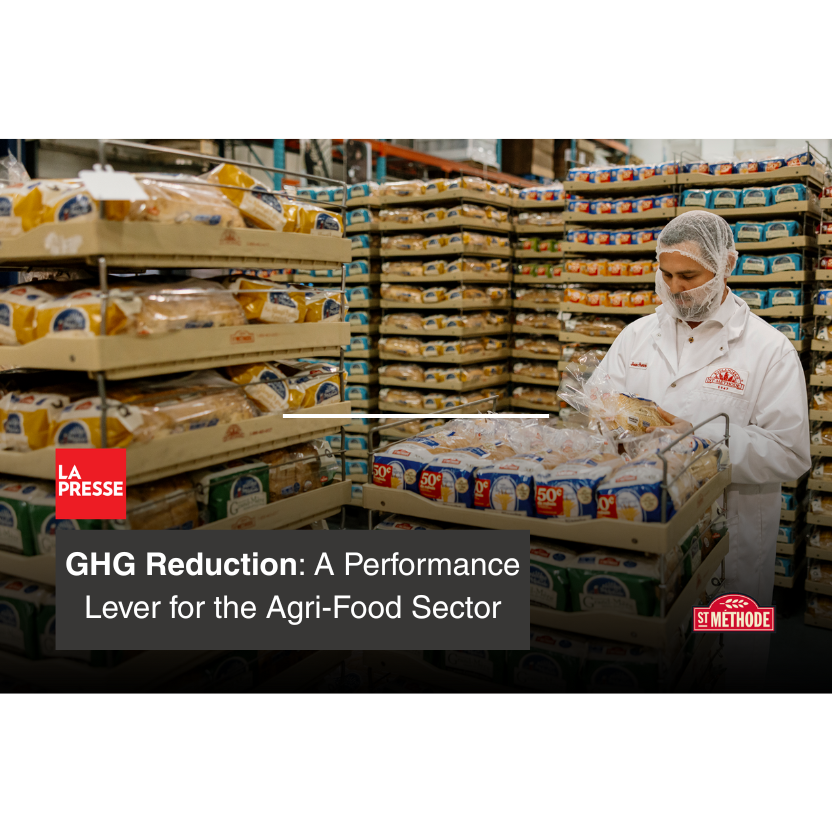GHG Reduction: A Performance Lever for the Agri-Food Sector
GHG Reduction: A Performance Lever for the Agri-Food Sector
When the leadership team at Boulangerie St-Méthode began a process to reduce their environmental footprint, they, like many business owners, felt the need for guidance. Operating in a complex business environment, this food processor succeeded in turning greenhouse gas (GHG) reduction into a lever for greater competitiveness.
“We were looking for people who could help us carry out a carbon assessment. We wanted to take ownership of the numbers and build a structure around our sustainable development activities,” explains Jean-François Faucher, Director of Procurement and Sustainable Development at the company founded by his grandparents.
According to a Léger survey conducted among food processing companies in Quebec, 87% of them believe it is important to take action to reduce their climate impact1.
An Approach Tailored to SMEs
The Quebec-based flagship company turned to Inno-centre for support in reducing the environmental impact of its operations. For over 35 years, the consulting firm has helped SMEs across all industrial sectors enhance their business performance through specialized advisory programs.Among these is the GHG reduction program, offered free of charge to food processors.
“In a mandate like this one with Boulangerie St-Méthode, our role is to help companies reduce their greenhouse gas emissions — but always from a business performance perspective,” explains Eric Waterman, Vice President, Agri-Food.
The firm stands out for its pragmatic, hands-on approach. In the field, more than 125 experienced advisors from diverse business sectors bring their concrete expertise to the table.
“There must be a return on investment and a measurable improvement in performance. Do the planned GHG reduction measures optimize operations, supply chains, and so on? Is it financially viable for the company? If not, we must find another strategy.”
— Eric Waterman, Vice President, Agri-Inno-centre
Des actions qui portent leurs fruits
At Boulangerie St-Méthode, the desire to adopt sustainable practices was already well established.
“We knew we were already doing a lot of good things,” says Jean-François Faucher. “But this exercise helped confirm it.”
For instance, the company’s transport logistics had already been designed to minimize both GHG emissions and costs.
“They had strong initiatives,” confirms Eric Waterman. “We helped them quantify these actions, and also identify other areas of their operations that could be improved.”
Developing a new bread recipe that requires less baking time.
Reducing production line losses and retailer returns by producing the right quantities.
Minimizing waste and food loss through circular economy initiatives that give a second life to organic residues.
“We established a three-year plan that includes actions like these,” notes the Boulangerie St-Méthode representative.
In 2023 and 2024, one GHG reduction initiative stemming from R&D efforts enabled Boulangerie St-Méthode to cut 74 tonnes of CO₂ equivalent from its production — the equivalent of driving around the Earth 7.4 times.
Sustainability as a Performance Driver
Beyond the carbon footprint results, such an exercise offers an opportunity to conduct a 360° assessment of the business and identify new opportunities.
“Our work on GHG reduction allows entrepreneurs to see their company from a whole new perspective,” says Eric Waterman.
The Léger study of Quebec food processors revealed that productivity, cost optimization, and market growth are the main priorities of the companies surveyed.¹
“These are three elements that GHG reduction can positively influence,” notes the expert. “Reducing emissions can mean optimizing operations, cutting costs, reducing waste, and gaining access to new markets.”
That’s why, in today’s highly competitive business environment, SMEs have every reason to focus on their GHG emissions.
“It’s important for securing their place in the supply chain — where stakeholders are increasingly demanding on this front — but also for market diversification,” summarizes Eric Waterman, referring to the European market’s strong focus on sustainability initiatives.
A Program Made Possible by Collaboration
Inno-centre’s advisory program for food processors is made possible through the financial support of the Ministry of Agriculture, Fisheries and Food (MAPAQ) and the Ministry of the Environment, the Fight Against Climate Change, Wildlife and Parks (MELCCFP), as part of the 2030 Green Economy Plan, and in collaboration with the International Reference Centre for the Life Cycle of Products, Processes and Services (CIRAIG).
1Study conducted by Léger Research among 131 companies in Quebec’s food processing sector. Data were collected through an online survey (open link distribution) between January 20 and February 19, 2025.


